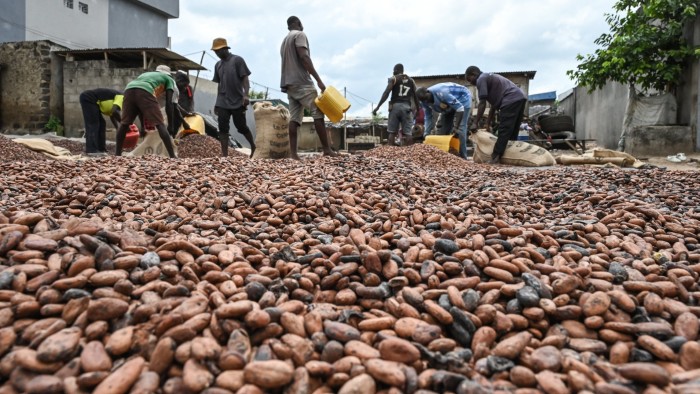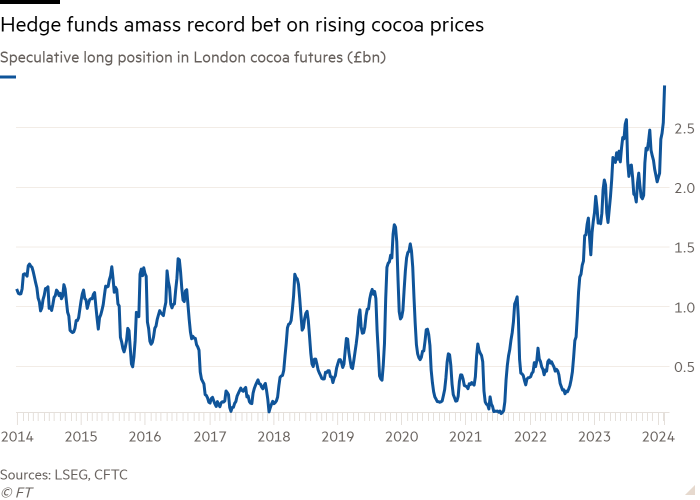Hedge fund stampede into cocoa futures fuels record price jump

Roula Khalaf, Editor of the FT, selects her favourite stories in this weekly newsletter.
Hedge funds have piled into the cocoa market since the end of last year, exacerbating a record-breaking surge in prices sparked by poor harvests in West Africa.
Speculative traders have amassed an $8.7bn bet across London and New York cocoa futures contracts that prices will continue to rise, the largest ever in dollar terms, according to positioning data from the Commodity Futures Trading Commission.
The wager, which has earned bumper profits for trend-following hedge funds in 2024, has helped to drive the London price to a record close of £4,757 per ton last Friday, more than double the level a year ago. New York cocoa futures have surged to $5,888.00 per ton, also an all-time high.
While poor weather and disease afflicting the cocoa trees in the world’s main cocoa growing regions in West Africa sparked the rally, the hedge fund stampede has added to its fierceness, according to analysts, traders and brokers.
Hedge funds have probably the “biggest risk exposure to cocoa that they’ve ever had”, said Martijn Bron, who was global head of cocoa and chocolate trading for agricultural commodities giant Cargill until 2022. “Hedge funds are not the cause of the rise,” he said, “but in a lower liquidity market environment, they can amplify fundamentally justified market moves to extreme levels.”

Justin Grandison, director of cocoa brokerage at ABN AMRO Bank, said that there has been “an influx of money into soft commodities” in the wake of the global financial crisis. Many of these funds were “blown out of the water around six to eight years ago”, after unexpected weather events and geopolitical crises caused their bets to sour. “Now they are returning,” said Grandison.
Today, the majority are systematic funds that use algorithms to ride market trends, he said.
Cocoa has been the single biggest contributor to profits at such funds this year, according to a portfolio compiled by Société Générale, which aims to emulate a typical strategy in the sector.
“Various speculative traders that have not been trading cocoa for a long time have now jumped in,” said Harold de Boer, managing director at Transtrend, a Rotterdam-based quantitative hedge fund.
Big cocoa processors, who turn beans into cocoa butter, are scrambling to find enough supply to meet demand from chocolate makers, warned analysts and traders.
The concentration of hedge fund bets, and the market volatility they create, has made it tougher for processors to hedge their exposure to price swings, according to Darren Stetzel, vice-president for Asia soft and agricultural commodities at the brokerage StoneX.
Higher prices in futures markets do not flow directly to growers in Ghana and Ivory Coast, which together produce the bulk of the world’s supply of beans.
Ghanaian farmers are receiving between $1,800 and $1,900 per ton of cocoa and Ivorian growers about $1,600, according to Fuad Mohammed Abubakar, head of the Ghana Cocoa Marketing Company, part of the government-controlled body that sets farmgate prices. In Ivory Coast Le Conseil Café-Cacao plays the same role.
Today’s farmgate prices reflect sales made between 12 and 18 months ago, said Abubakar. “The current [market] prices will be reflected in the farmers’ pockets at the start of the new season at the start of October.”
But according to Grandison, these price-fixing measures could hamper the market’s ability to respond to the current higher prices and reach a new supply and demand equilibrium.
“In years gone by, higher prices were seen to benefit the producer and allow for reinvestment. However, with the prices set by governments based on forward sales for the year, [farmers] are missing out,” he said.
Comments